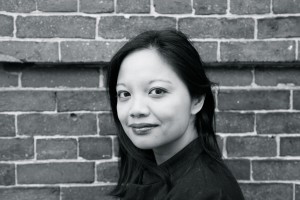FPP spoke with poet J. Mae Barizo about spatial memorization, traum and trauma, and artistic cross-pollination. J. Mae reads with us at the FPP season opener on September 15 at Shrine in Harlem.
 Many of the poems in The Cumulus Effect seem to be interested in the oscillation between pattern and the unraveling of pattern and predictability. Could you talk about the role of chaos and order, of messiness and control in your poetry?
Many of the poems in The Cumulus Effect seem to be interested in the oscillation between pattern and the unraveling of pattern and predictability. Could you talk about the role of chaos and order, of messiness and control in your poetry?
The sequential poems in The Cumulus Effect, all of which are untitled, represent for me a kind of distillation of form. They’ve been described as minimalist; for me they embody emotion condensed to small parcels of verse, almost haiku-like but without the formal restraints. Later on in the book, I think the narrative loosens, embraces more of a surreal quality, the language of traum and trauma. Perhaps that’s the chaos and messiness you mention? It’s true that I long to transform the chaos of personal history into something elliptical, elegant.
How would you like the poems in The Cumulus Effect to work on the reader as he or she moves through them? In what state do you hope to leave your reader?
The book’s structure alludes to “method of loci” or “memory palace,” the ancient mnemonic technique of spatial memorization. I wanted to put on the page the mercurial quality of memory. To describe the headiness of disorientation, the way the body locates itself as it remembers. Whether it be extreme pain or pleasure. So if the reader is disoriented to a certain extent, I don’t mind 
I’ve also noticed scrupulous attention to negative space, pause, chasm, and silence in your poetry. Does your background as a musician inform how you deploy your presence and absence on the page?
I think I’m drawn to extremes. Well, actually, I’m quite sure of it. The sexy atonality of Berg’s Wozzeck contrasted with the cerebral poise of Bach’s Preludes and Fugues. So I suppose these polarities exist in my writing as well. I’m also drawn to the concept of absence. Bachelard has an aesthetic notion of absence as otherness. In a sense, only the absence of a thing allows me to fully inhabit it.
You describe yourself as an advocate of cross-disciplinary work. What kinds of cross-pollination do you find most exciting? And what sort of mixing would you like to try that you haven’t yet?
For me the poem is not simply an aesthetic object for contemplation isolated on the page; it can be seen and heard. Recently I’ve been thinking of hybrid forms that involve video art, sound/text installations, hand-made artist ephemera. But my favorite artistic collaborators are my closest friends, those I feel a profound connection with, artistically and intellectually.
